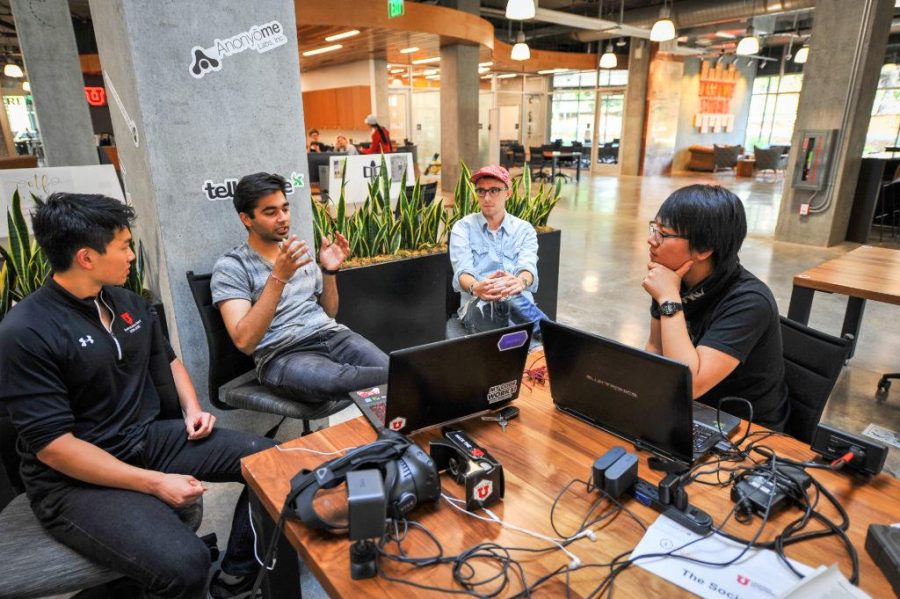There are a handful of early signs that a startup will be successful, according to research website Quid: Have the firm’s founders worked closely before? Is the business in a hot industry, one where many other startups are also emerging? Has it raised funds quickly and early on?
Based on those criteria, some University of Utah resident startups in the Lassonde Entrepreneur Institute’s Company Launch Program have promising prospects.
Seventeen student-run businesses were given office space or had their spot renewed in the Lassonde Studios at the start of the summer semester. Startups in residence can receive grants, connect with students and get advice from experts, contingent that they set milestones and continue to progress.
For founders of GRACE Foundry, designers of cooperative video game “Finding Gravity,” the idea for their startup sparked during a group project in a game development class in the U’s top-ranked Entertainment Arts and Engineering program.
“We found that not only did we work really well together, but we also had a good product on our hands,” said Conan Zhang, a first-year entertainment arts and engineering master’s student.
After forming a dynamic team, Zhang, along with Georbec Ammon, Aaron Hsu, Rajul Ramchandani and Evan Jackels, decided to test the game’s market potential on Kickstarter. Within one month, the group reached their goal of $1,250, validating their assumptions that the game could fill a gap in virtual reality co-op gaming.
“It was then that we decided, ‘Hey, let’s start a virtual reality indie studio,’” Zhang said.
Zhang added that many co-op or party games for consoles already exist, but there are few that feature virtual reality or simulated 3D worlds viewed through special goggles.
“We want to make people see VR as a way to bring people together rather than a way to isolate yourself from the world,” Zhang said.
The series of startups, such as GRACE Foundry, that have office space in the Lassonde Studios, a collaborative learning and prototyping space open to all students, are part of roughly 50 student-run businesses within the Company Launch Program. Students in the program can seek advice from legal or financial experts, build product prototypes and apply for monthly “Get Seeded” grants.
Studio resources aren’t reserved for those in the Company Launch Program, according to Thad Kelling, marketing manager of the Lassonde Institute.
“It’s a very fluid environment,” Kelling said. “It’s a mixing space for every student and a place to explore ideas with different groups of people.”
He said students, regardless of major or affiliation with the Entrepreneurial Institute, can also use the Lassonde Studios tools, apply for grants and attend workshops.
Kelling attests the most successful resident startups have been those that collectively use all of the resources available in the Company Launch Program.
“They repeatedly apply for grants and seek growth through guidance and workshops,” Kelling said. “Most importantly, they really take advantage of the community here.”
Lassonde’s 17 startups in residence:
ADA Mobile Assessment Systems — Builds mobile data collection systems for sidewalks, ramps and accessible routes to ensure compliance with the American Disability Act.
Andriese Entertainment, LLC — Provides professional production such as audio, lighting, MC and DJ services for events.
AptiTekk — Designs and crafts software to solve common efficiency problems that schools and businesses face.
BOTPOT — Controls robotic cooking appliances through an app, giving users convenient and scheduled food and eliminating the need for fast-food.
Blerp — Makes soundbites shareable and accessible, similar to GIF-sharing, in a searchable soundboard.
Cocpit-Labs — Solves problems that small teams face by growing new technology into a sustainable business.
Decimate Limits — Designs fitness supplement mixers, apparel and protein supplements.
Grace Foundry — A video game that gives users a cooperative gaming experience within a virtual reality.
Hashtaggy — Uses mobile technology to connect college students to every campus activity, hang out and event they might be interested in.
Portal Power — Provides a backup, rechargeable Portal Cord, which doubles as a USB charging cord.
Project Embrace — Reduces global health inequalities and promotes a healthier planet through the way of a non-profit organization.
Utah Maids — An app that allows users to schedule and pay for a home cleaning via computer or smartphone.
Index — Simplifies the contact sharing process by creating a platform that can share contact information with social networks with one QR code.
Off the Frame Photography — Authentic and unique portrait photography, small business product photography and social media marketing.
LIT Outdoors — An outdoor company creating unique products to allow hammock users to expand their camping possibilities.
Situ — Reduces textile waste by designing new products for soft-good companies with the businesses existing material waste and factory rejects.
The Society — Connects people with popular local bars, restaurants, pubs and nightclubs.
Zampi — Gives small businesses a way to manage their freelancers and get accurate insights.


